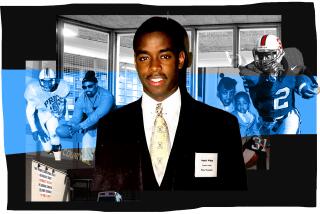Aunt Was Generous to a Fault, Court Says
- Share via
BENNINGTON, Vt. — Luella Wilson’s tiny frame and stooped walk are misleading. This 91-year-old woman, who stands to lose her home and life savings because of an unusual court case, is tough.
In her younger years, Wilson stood her ground on hunting expeditions for coyotes and moose; trophies hang in her home to prove her success. She ran her family’s dude ranch for years, caring for up to 52 horses until last year.
Shuffling around her cluttered home and pointing out prized possessions, Wilson boasts that she once owned a nightclub and “handled” eight bartenders--not to mention rowdy patrons.
But Wilson fears she’s finally met her match in the legal system.
She’s uncharacteristically confused, tangled in a legal nightmare she says is not of her own making, but which threatens to cost her everything she has collected over her nine-plus decades.
Wilson’s troubles began in 1984 when she gave her great-nephew, Willard Stuart, $6,300 for his 18th birthday to buy a car. Although Stuart did not have a driver’s license--Wilson knew that when she gave him the money--he drove the car.
Three weeks later, after a night of heavy drinking and smoking marijuana, Stuart drove the car off a bridge. A back seat passenger, Mark Vince, was paralyzed and later had a leg amputated.
The passenger sued Wilson, saying she knew that Stuart did not have a license and that he used drugs, and therefore was negligent in giving him money to buy a car.
A Superior Court jury agreed, ordering Wilson to pay the passenger $950,000 in damages. Her home has been inventoried for sale and her savings locked up by the courts.
The Vermont Supreme Court, however, says others may share the blame with Wilson, including the dealership that sold Stuart the vehicle. A Superior Court jury will decide that question in December.
“He used to be my favorite nephew,” Wilson said last week. “His mother used to get him up in the morning, dress him, and he would come running through my meadow and stay here with me all day.”
Although he still lives nearby, Wilson hasn’t talked to Stuart since the verdict and has seen him only as he drives by her home.
“I don’t know if he feels so bad about it that he doesn’t want to talk to me,” she said. “When you get into an awful mess, you don’t know how people are going to feel about it.”
Publicity over Wilson’s plight has sparked a wave of support, and her kitchen table is littered with about 50 letters from people offering money or assistance.
Others around the nation are watching this case because of its precedent-setting potential.
They say there would be enormous ramifications if the court finds either the dealership or salesman negligent for selling the car to someone who did not have a license and was later in an accident.
Such a ruling could affect banks, other car dealerships, or anyone who lends or gives money to another individual.
The passenger’s attorney, Rolf Sternberg, told the New York Times recently that the ruling is in keeping with legal doctrine that a person who gives a dangerous tool to another is liable for any resulting damage, and said Wilson’s claims of poverty are exaggerated.
“She is not destitute,” Sternberg said. “The court order said her assets are to be frozen except for what she needs to live adequately. Somebody is trying to make it difficult to pick a fair and impartial jury.”
Wilson says the law is wrong, that there is no one to blame but those directly involved in the accident. She believes she is guilty only of giving her nephew a certified check and the sole reason she was sued is that she is the only one with any money.
Wilson, who was hospitalized in October after collapsing in her kitchen, vows to attend court in December, saying her failure to attend the original proceeding and tell her side of the story may have cost her the case.
For now, her world is her home. She smiles at the good old days even as she awaits the court’s decision.
The lesson to be learned? “If you have any relatives, just don’t give them nothing. Don’t give them any money,” Wilson said.
More to Read
Sign up for Essential California
The most important California stories and recommendations in your inbox every morning.
You may occasionally receive promotional content from the Los Angeles Times.













